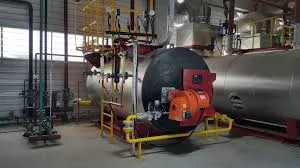
Oct . 09, 2024 23:56 Back to list
hot water boiler operation
The Operation of Hot Water Boilers A Comprehensive Overview
Hot water boilers are vital components in many residential and commercial heating systems. They play a crucial role in ensuring that buildings are kept at a comfortable temperature, especially during colder months. Understanding the operation of hot water boilers can help in optimizing their efficiency, increasing their lifespan, and ensuring safety.
What is a Hot Water Boiler?
A hot water boiler, commonly referred to as a hydronic boiler, is a closed vessel that heats water through the combustion of fuel or the use of electricity. The heated water is then circulated throughout the building via a network of pipes, delivering warmth to radiators, underfloor heating systems, and domestic hot water outlets.
Types of Hot Water Boilers
There are several types of hot water boilers. The most common include
1. Conventional Boilers These boilers heat water and store it in a tank until it's needed. They come in various sizes, from small residential models to large industrial units.
2. Combi Boilers These units provide both heating and hot water without the need for a separate storage tank. They are popular in homes with limited space.
3. System Boilers Similar to conventional boilers, but they have built-in components that make them easier to install. They still require a hot water cylinder for storage.
4. Condensing Boilers These are highly efficient models that extract heat from exhaust gases, recycling it to heat the water. They are environmentally friendly options that can significantly reduce energy bills.
The Heating Process
The operation of a hot water boiler involves several key steps
1. Water Filling The boiler begins its operation with cold water being filled into the system. Most boilers have a fill valve that introduces water until it reaches the necessary pressure level.
hot water boiler operation

2. Heat Generation The heating process starts when the fuel source—such as natural gas, propane, oil, or electricity—being burned heats the water in the boiler. In condensing boilers, the heat exchange process extracts more energy from the exhaust gases, optimizing efficiency.
3. Water Circulation Once the water reaches the desired temperature, it is circulated through pipes to various parts of the building. This circulation is typically facilitated by pumps designed to ensure a consistent flow of hot water throughout the system.
4. Heat Distribution Hot water travels through radiators or other heating elements, transferring its heat to the surrounding air. As the water cools, it returns to the boiler to be reheated, creating a continuous cycle.
Safety Mechanisms
Safety is a paramount concern in hot water boiler operation. Boilers are equipped with various safety features to prevent overheating, pressure build-up, or potential malfunctions
- Pressure Relief Valves These valves release excess pressure that builds up within the system, preventing dangerous situations.
- Temperature Sensors These monitor the water temperature and ensure the boiler does not overheat.
- Automatic Shut-off Systems In cases of malfunction, these systems automatically shut down the boiler to prevent further issues.
Maintenance and Efficiency
Regular maintenance is essential for the efficient operation of hot water boilers. Routine checks, such as inspecting the pressure, checking for leaks, and testing safety devices, can prolong the boiler's lifespan. Additionally, flushing the boiler periodically to remove sediment buildup helps maintain efficiency.
To enhance boiler efficiency further, homeowners and businesses can consider upgrading to modern condensing boilers that utilize advanced technology and offer better energy savings. Insulating pipes and optimizing the heating system layout can also contribute to reduced energy consumption.
Conclusion
Hot water boilers are critical in providing heating and hot water for various applications. Understanding how they operate is essential for maximizing their efficiency, ensuring safety, and prolonging their lifespan. By keeping abreast of maintenance requirements and considering modern upgrades, users can enjoy the comfort of a well-heated environment while also minimizing their energy costs. Whether for residential or commercial use, the efficient operation of hot water boilers is key to a sustainable and comfortable living space.
-
High-Efficiency Commercial Oil Fired Steam Boiler for Industry
NewsJul.30,2025
-
High-Efficiency Biomass Fired Thermal Oil Boiler Solutions
NewsJul.30,2025
-
High Efficiency Gas Fired Thermal Oil Boiler for Industrial Heating
NewsJul.29,2025
-
High-Efficiency Gas Fired Hot Water Boiler for Sale – Reliable & Affordable
NewsJul.29,2025
-
High Efficiency Biomass Fired Hot Water Boiler for Industrial and Commercial Use
NewsJul.29,2025
-
High-Efficiency Biomass Fired Hot Water Boiler for Industrial Use
NewsJul.28,2025
Related PRODUCTS






















